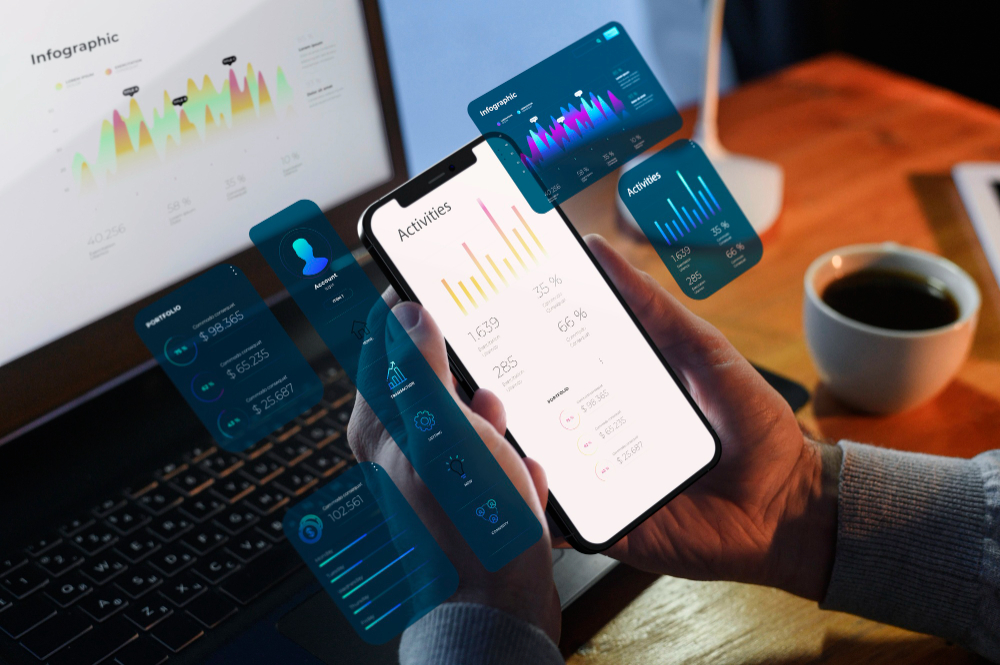The landscape of personal finance has undergone a dramatic transformation in 2024, largely driven by the continued evolution of digital technology.
As we navigate through this digital age, the tools and strategies at our disposal for managing our finances—be it budgeting, saving, or investing—have become more sophisticated, personalized, and accessible.
This article delves into the current trends in personal finance, highlighting how individuals can effectively manage their finances in today's digital environment.

The Rise of Digital Budgeting Tools
The first significant trend in 2024 is the widespread adoption of digital budgeting tools. These platforms have revolutionized the way we plan and control our spending.
Budgeting Apps
Apps like Mint, You Need A Budget (YNAB), and PocketGuard have become household names, offering users comprehensive features for tracking expenses, categorizing spending, and setting financial goals. These apps not only provide insights into where your money goes but also offer personalized recommendations for saving more.

Customizable Spreadsheets
For those who prefer a hands-on approach, customizable spreadsheets continue to be popular. Tools like Google Sheets and Microsoft Excel allow for the creation of detailed budgeting templates that can be tailored to individual needs, providing a clear overview of financial health.
The Evolution of Saving Strategies
As digital technology advances, so do the methods by which we save our money.
Automated Savings Accounts
Banks and financial institutions now offer automated savings accounts, which automatically transfer a predetermined amount of money from checking to savings accounts, simplifying the saving process and helping to build savings without effort.

Micro-Investment Platforms
Platforms like Acorns and Stash have introduced the concept of micro-investing, where small amounts of money are automatically invested into diversified portfolios, making investing more accessible and integrating saving with investing.
Investment Trends in 2024
Investing in 2024 has seen a shift towards more accessible and automated options.
Cryptocurrency
Cryptocurrency continues to be a popular investment choice for many, with platforms making it easier for the average person to buy, sell, and hold digital currencies.

Robo-Advisors
Robo-advisors like Betterment and Wealthfront have democratized investing, offering automated investment services based on sophisticated algorithms, making it easier for individuals to invest based on their risk tolerance and financial goals.
Socially Responsible Investing
There's a growing trend towards socially responsible investing (SRI), where investments are made in companies that adhere to social, environmental, and governance criteria, reflecting a desire to impact the world positively through investment choices.
Financial Literacy and Education
The digital age has also brought about a wealth of resources for enhancing financial literacy and education. As personal finance becomes increasingly complex, the importance of understanding financial principles and practices has never been more critical.
Online Courses and Workshops
The proliferation of online courses and workshops has made financial education more accessible to a wider audience. Platforms like Coursera, Udemy, and Khan Academy offer courses on a range of topics from basic budgeting to advanced investing, often taught by industry experts. This democratization of financial knowledge empowers individuals to make informed decisions about their finances.

Financial Podcasts and Blogs
In addition to formal courses, there's a surge in the popularity of financial podcasts and blogs. These platforms offer insights, advice, and commentary on the latest trends in personal finance, making it easier for individuals to stay informed and engaged with their financial health. Podcasts like "The Dave Ramsey Show" and blogs like "Mr. Money Mustache" have garnered large followings by offering actionable financial advice in an accessible and relatable format.
The Future of Personal Finance
As we look to the future, it's clear that the trends in personal finance will continue to evolve. The integration of artificial intelligence and machine learning in financial tools will likely make personalized financial advice even more accurate and accessible. Blockchain technology could also revolutionize how we think about money, making transactions more secure and transparent.
Innovation in financial technology (FinTech) will continue to provide individuals with more tools and resources to manage their finances effectively. As digital natives become a larger portion of the economy, their preferences for mobile, intuitive, and automated financial services will drive further advancements in the field.

Conclusion
The landscape of personal finance in 2024 is markedly different from years past, shaped by the rapid advancement of digital technology. From sophisticated budgeting tools and innovative saving strategies to accessible investment options and the emphasis on financial literacy, managing personal finances in the digital age offers both challenges and opportunities.
By embracing these trends and leveraging the tools available, individuals can navigate the complexities of personal finance with confidence, making informed decisions that secure their financial future.







